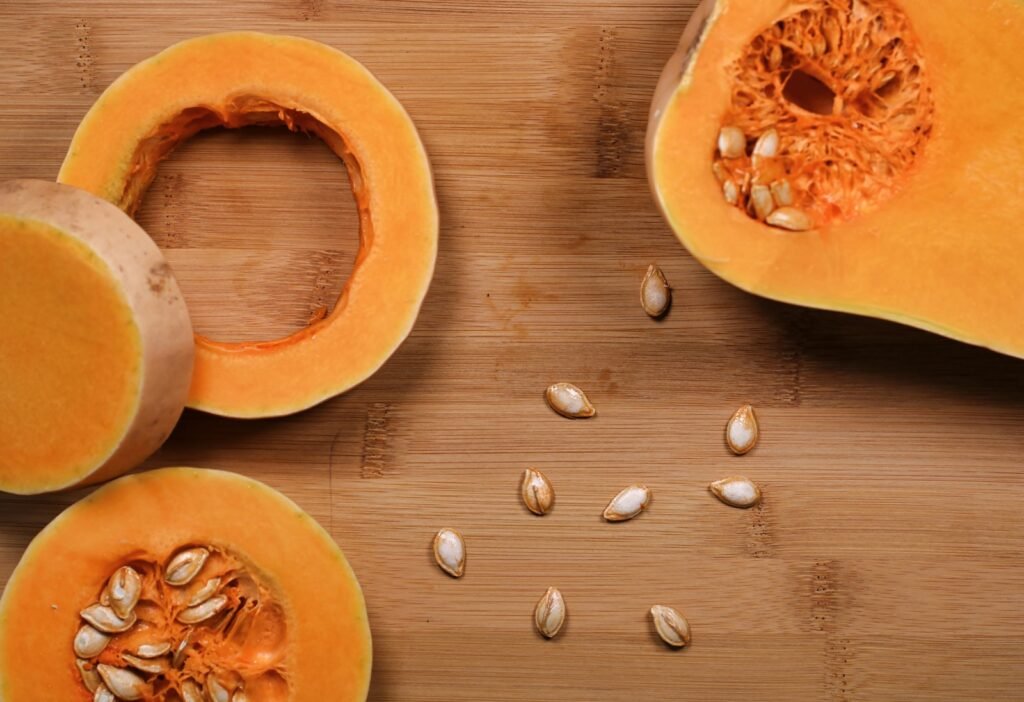Feeling stressed? Your diet can play a big role in managing those tricky emotions. Eating the right foods may help lower your stress levels and improve your mood.
Certain foods can reduce cortisol, the main stress hormone in your body, and promote a sense of calm.
Good nutrition is key for mental health and stress relief.
Foods rich in omega-3 fatty acids, like salmon and other fatty fish, can help calm your brain. Fruits and veggies high in vitamin C, such as oranges and spinach, may support your adrenal glands and keep cortisol levels in check.
Chronic stress can take a toll on your body and mind. But don’t worry – you have the power to make positive changes through your food choices.
By adding stress-busting foods to your meals, you can take steps towards better mental health and a more relaxed state of mind.
Understanding Stress and Nutrition
Stress and food are closely linked. What you eat can affect how you feel, and how you feel can influence what you eat. Let’s look at how stress impacts your body and how food can help or hurt your stress levels.
The Impact of Stress on the Body
Stress triggers your body’s “fight or flight” response. This releases stress hormones like cortisol. These hormones can:
- Raise your heart rate and blood pressure
- Cause inflammation
- Weaken your immune system
- Lead to weight gain, especially around your belly
Over time, chronic stress can increase your risk of health problems. These may include heart disease, diabetes, and depression.
Your body uses up more nutrients when you’re stressed. This can lead to vitamin and mineral deficiencies if you don’t eat well.
How Food Affects Mood and Stress Levels
The foods you eat can make a big difference in how you handle stress.
A balanced diet rich in fruits and vegetables may help lower your stress levels.
Some foods that may help reduce stress include:
- Complex carbs like whole grains
- Foods high in vitamin C
- Foods rich in omega-3 fatty acids
- Dark chocolate (in moderation)
These foods can boost feel-good chemicals in your brain like serotonin and dopamine. They may also help lower cortisol levels.
On the flip side, some foods can make stress worse. Try to limit:
- Caffeine
- Alcohol
- Sugary snacks and drinks
- Highly processed foods
Eating a healthy diet won’t make your stress disappear. But it can help you feel better and cope more easily with life’s ups and downs.
Foods That Help Lower Stress
Eating the right foods can help you feel calmer and more relaxed. Certain nutrients support your brain and body in managing stress. Let’s look at some foods that can help you unwind and feel better.
Nourishing Your Brain With Omega-3s
Omega-3 fatty acids are great for your brain and can help lower stress. You can find them in:
- Salmon and other fatty fish
- Chia seeds
- Walnuts
Try having salmon for dinner twice a week. Add chia seeds to your morning smoothie or oatmeal. Grab a handful of walnuts as a snack.
These foods give your brain what it needs to work well. They may help you feel less anxious and cope better with stress.
The Calming Power of Antioxidants and Vitamins
Fruits and veggies are packed with good stuff that can help you feel calmer. They have lots of antioxidants and vitamins that fight stress in your body.
Some great choices are:
- Berries (like blueberries and strawberries)
- Oranges
- Spinach
These foods have vitamin C, which can help lower stress hormones. Eat a bowl of mixed berries for breakfast. Have an orange as a snack. Add spinach to your salads or smoothies.
Vitamin E is also good for stress. You can find it in nuts, seeds, and leafy greens.
Probiotics and Prebiotics for Gut-Brain Harmony
Your gut and brain talk to each other all the time. Keeping your gut happy can help you feel less stressed. Probiotics and prebiotics can help with this.
Probiotic foods include:
- Yogurt
- Sauerkraut
- Kimchi
Eat yogurt for breakfast or as a snack. Try adding sauerkraut to your sandwiches. Have kimchi with your meals.
Prebiotics feed the good bacteria in your gut. You can find them in foods with fiber like beans, oats, and bananas.
Herbal Teas and Amino Acids for Relaxation
Sipping on certain teas can help you feel more relaxed. They have stuff in them that calms your mind and body.
Try these teas:
- Chamomile tea
- Green tea
- Matcha
Chamomile tea is great before bed. It might help you sleep better. Green tea and matcha have L-theanine, which can help you feel calm but alert.
Magnesium-Rich Foods for Stress Reduction
Magnesium is important for feeling calm. Your body uses it to relax your muscles and nerves.
Foods high in magnesium include:
- Pumpkin seeds
- Almonds
- Spinach
- Black beans
Snack on pumpkin seeds or almonds. Add spinach to your meals. Have black beans with your lunch or dinner.
Eating these foods regularly can help your body handle stress better. You might feel more relaxed and less worried.
Lifestyle Considerations for Stress Management
Diet is just one part of managing stress. Exercise and sleep also play key roles in helping you feel calmer and more relaxed.
The Role of Regular Exercise in Stress Reduction
Exercise is a great way to lower stress. When you work out, your body makes feel-good chemicals called endorphins. These help boost your mood and ease tension.
Aim for 30 minutes of exercise most days. You can:
- Go for a brisk walk
- Ride a bike
- Swim laps
- Take a fitness class
Even short bursts of activity can help. Try a 10-minute walk on your lunch break or do some stretches at your desk.
Exercise also helps lower cortisol, the stress hormone. This can make you feel more relaxed overall.
Regular workouts may also help you sleep better at night. This leads to more energy and less stress during the day.
The Importance of Sleep in Alleviating Stress
Getting enough sleep is key for stress relief. When you’re tired, small problems can feel much bigger.
Aim for 7-9 hours of sleep each night.
To improve your sleep:
- Stick to a regular sleep schedule
- Avoid screens before bed
- Keep your bedroom cool and dark
- Try relaxation techniques like deep breathing
A good night’s rest helps your body recover. It also lets your mind process the day’s events. This can help you feel calmer and more focused.
If stress keeps you up at night, try writing down your worries before bed. This can help clear your mind for better sleep.
Frequently Asked Questions
Food plays a big role in managing stress. Certain foods can help you feel calmer, while others may make stress worse. Let’s look at some common questions about diet and stress.
What are some foods known for their stress-relieving properties?
Fatty fish like salmon can help lower stress levels. They have omega-3 fats and vitamin D that may reduce stress. Nuts and seeds are also good choices. They have nutrients that support your mood.
Dark chocolate in small amounts may help too. It can lower stress hormones in your body. Berries are another tasty option. Their antioxidants may help manage stress.
Are there specific foods that help alleviate anxiety symptoms?
Yes, some foods may ease anxiety. Yogurt and eggs are good breakfast options. They have nutrients that support brain health. Fresh fruits and veggies are also helpful. Try adding a salad or carrot sticks to your lunch.
Nuts make a great snack for anxiety relief. They have healthy fats and vitamins that may calm your nerves. Bananas are another good choice. They have potassium, which can help reduce stress.
Which foods should be avoided for managing stress levels effectively?
It’s best to limit processed foods when you’re stressed. These can cause quick changes in blood sugar, which may make you feel more anxious.
Sugary foods and drinks can have the same effect.
Caffeine can make stress worse for some people. You might want to cut back on coffee and energy drinks. Alcohol is another thing to avoid. It may seem to help at first, but it can disrupt your sleep and mood.
How can diet influence the balance of stress hormones in the body?
Your diet can affect stress hormones like cortisol. Eating potassium-rich foods may help balance cortisol levels.
Good choices include bananas, oranges, and sweet potatoes.
Foods high in vitamin C are also helpful. Your body uses vitamin C to make stress hormones. Eating fruits and veggies can keep your levels steady. This may help you handle stress better.
Could you suggest any beverages that aid in stress relief?
Herbal teas can be very calming. Chamomile tea is a popular choice for relaxation. Green tea has a little caffeine but also has compounds that may reduce stress.
Water is also important. Being dehydrated can make you feel more stressed. Try to drink plenty of water throughout the day. You can add lemon or cucumber for extra flavor.
What nutritional choices are recommended for combatting depression and stress?
A balanced diet is key for fighting depression and stress.
Aim for plenty of fruits and vegetables. They have nutrients that support brain health.
Lean proteins like chicken or fish are good choices. They help keep your energy steady.
Whole grains are also helpful. They provide B vitamins that may improve your mood.
Don’t skip meals when you’re stressed. Eating regularly helps keep your blood sugar stable.
This can have a big impact on your mood and stress levels.


